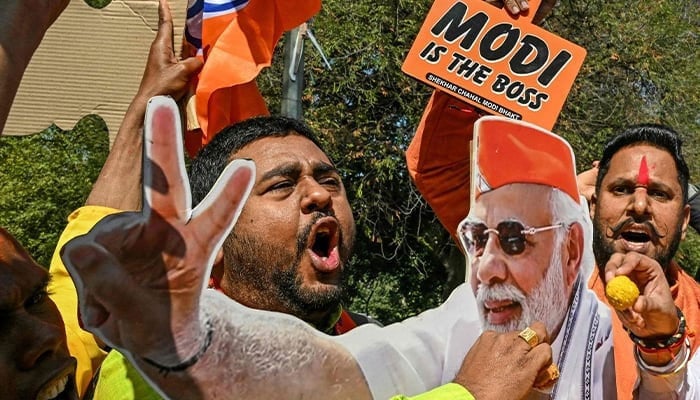Hate in India
Recent report by US-based IHL has shed light on the alarming rise of hate speech against minorities in India
For decades, India stood as a beacon of pluralism, a nation that prided itself on its diversity and the peaceful coexistence of its numerous religious and ethnic communities. Secularism was once the jewel in the Indian crown, serving as a fundamental pillar of its democracy. While internal tensions existed, successive governments managed to maintain a delicate balance, ensuring that India projected an image of inclusivity and tolerance to the world. However, under the leadership of the Bharatiya Janata Party (BJP), this secular identity has been systematically eroded, replaced by an aggressive brand of Hindu nationalism that has made hate speech and religious bigotry disturbingly commonplace. A recent report by the US-based India Hate Lab (IHL) has shed light on the alarming rise of hate speech against minorities in India. According to the report, incidents of hate speech surged by 74 per cent in 2024, peaking during the country’s national elections. The data paints a grim picture: out of 1,165 documented instances, an overwhelming 98.5 per cent were directed against Muslims. The report identifies key figures in the Indian government, including Prime Minister Narendra Modi and Home Minister Amit Shah, as frequent perpetrators of divisive rhetoric.
The BJP’s strategy has long been rooted in fostering divisions among religious communities to consolidate its Hindu nationalist base. This political project finds its most apparent manifestation in the vilification of Muslims. The historical animosity between India and Pakistan is frequently weaponised to justify the marginalisation of Indian Muslims, portraying them as the ‘other’ and casting doubts on their loyalty to the nation. Kashmir’s occupation has now been reframed as a religious battle, further entrenching Islamophobia within Indian society. This calculated strategy extends beyond mere rhetoric. The BJP has overseen policies and actions that directly disenfranchise Muslim communities, from the abrogation of Article 370 in Occupied Jammu and Kashmir to the enactment of the discriminatory Citizenship Amendment Act (CAA). Meanwhile, economic and social boycotts of Muslims are increasingly normalised, as right-wing groups openly call for their exclusion from public life. Even Muslim athletes and public figures find themselves under intense scrutiny, expected to prove their allegiance at every turn.
The implications of this orchestrated hatred are deeply troubling. Once celebrated for its democratic values, India is now making headlines for state-sanctioned bigotry and the erosion of minority rights. The BJP’s vision for a Hindu-majority India is reminiscent of dark chapters in history where nationalism was used as a tool for exclusion and oppression. By prioritising Hindu nationalism over the country’s pluralistic ethos, the BJP is jeopardising India’s long-term stability. A nation that once championed unity in diversity is now dangerously close to fracturing along religious lines. India’s secular identity was built over decades of struggle and sacrifice, championed by leaders who envisioned a nation where all citizens, regardless of faith, could thrive. The current trajectory threatens to undo this legacy. Unfortunately, not too many signs point to any course correction efforts.
-
 Extreme Cold Warning Issued As Blizzard Hits Southern Ontario Including Toronto
Extreme Cold Warning Issued As Blizzard Hits Southern Ontario Including Toronto -
 Lana Del Rey Announces New Single Co-written With Husband Jeremy Dufrene
Lana Del Rey Announces New Single Co-written With Husband Jeremy Dufrene -
 Ukraine-Russia Talks Heat Up As Zelenskyy Warns Of US Pressure Before Elections
Ukraine-Russia Talks Heat Up As Zelenskyy Warns Of US Pressure Before Elections -
 Lil Nas X Spotted Buying Used Refrigerator After Backlash Over Nude Public Meltdown
Lil Nas X Spotted Buying Used Refrigerator After Backlash Over Nude Public Meltdown -
 Caleb McLaughlin Shares His Resume For This Major Role
Caleb McLaughlin Shares His Resume For This Major Role -
 King Charles Carries With ‘dignity’ As Andrew Lets Down
King Charles Carries With ‘dignity’ As Andrew Lets Down -
 Brooklyn Beckham Covers Up More Tattoos Linked To His Family Amid Rift
Brooklyn Beckham Covers Up More Tattoos Linked To His Family Amid Rift -
 Shamed Andrew Agreed To ‘go Quietly’ If King Protects Daughters
Shamed Andrew Agreed To ‘go Quietly’ If King Protects Daughters -
 Candace Cameron Bure Says She’s Supporting Lori Loughlin After Separation From Mossimo Giannulli
Candace Cameron Bure Says She’s Supporting Lori Loughlin After Separation From Mossimo Giannulli -
 Princess Beatrice, Eugenie Are ‘not Innocent’ In Epstein Drama
Princess Beatrice, Eugenie Are ‘not Innocent’ In Epstein Drama -
 Reese Witherspoon Goes 'boss' Mode On 'Legally Blonde' Prequel
Reese Witherspoon Goes 'boss' Mode On 'Legally Blonde' Prequel -
 Chris Hemsworth And Elsa Pataky Open Up About Raising Their Three Children In Australia
Chris Hemsworth And Elsa Pataky Open Up About Raising Their Three Children In Australia -
 Record Set Straight On King Charles’ Reason For Financially Supporting Andrew And Not Harry
Record Set Straight On King Charles’ Reason For Financially Supporting Andrew And Not Harry -
 Michael Douglas Breaks Silence On Jack Nicholson's Constant Teasing
Michael Douglas Breaks Silence On Jack Nicholson's Constant Teasing -
 How Prince Edward Was ‘bullied’ By Brother Andrew Mountbatten Windsor
How Prince Edward Was ‘bullied’ By Brother Andrew Mountbatten Windsor -
 'Kryptonite' Singer Brad Arnold Loses Battle With Cancer
'Kryptonite' Singer Brad Arnold Loses Battle With Cancer




